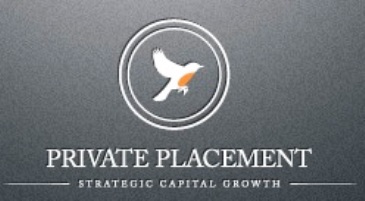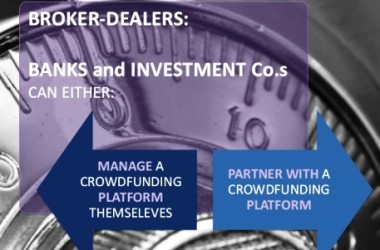
BrokerDealer.com curators have received many inquiries from across the industry with regard to equity crowdfunding rules and regs. As spotlighted by industry experts at RaiseMoney.com, the portal launched by Wall Street expats, the SEC is getting ready to formally announce new rules for the multi-billion dollar crowd fund industry, and towards addressing the common questions, below is post produced by Scott Purcell, serial entrepreneur and founder and CEO of FundAmerica. Purcell keeps a highly informative blog, focusing on equity crowdfunding in the US, and we are sharing the latest post below…and remind our readers that the following is for informational purposes only. BrokerDealers or Investment Advisors who are engaged in crowdfunding initiatives should consult with their compliance officer and an attorney.
This is the single most common question I get asked. There’s a lot of misinformation about this, so let’s clear it up…
BrokerDealer.com hosts the world’s most comprehensive database of brokerdealers operating across 35 countries worldwide
Keep in mind that a “platform” is just a website. It’s NOT a business in and of itself (people often confuse a 506b/c or Reg A platform with a Title III “portal” as defined in the JOBS Act, and they are very differrent things). A platform is simply a tool for general solicitation. So you are not a platform, you are an issuer/investment adviser/listing service/broker-dealer who might have a website that lists offerings of securities, might use other websites that promote offerings of securities, might use social media to promote offerings of securities, might run newspaper ads to promote offerings of securities, might send emails to promote offerings of securities…you get the picture.
Platform Types:
There are four main types of businesses using platforms to market securities pursuant to 506-D (aka “Title II of the JOBS Act”) and Regulation A (“Title IV”):
- Broker-dealers
- Investment advisers
- Ad/listing services
- Direct Issuers
Which one are you? Well that depends upon your business model.
Broker-dealers can charge commissions based upon the amount and/or success of an offering. They can also make specific recommendations (not to be confused with “general solicitation”, which anyone can do in a 506(c) or Reg A offering whether registered or not). BD’s typically charge around 8%+ of an offering to cover costs associated with compliance, due diligence, sales commissions, etc. So if you want to charge, for example, an 8% commission on a $1M offering then you need to either be a FINRA member firm or a registered representative of one.
NOTE: only BD’s and registered representatives can receive commissions or success-based compensation. You CANNOT receive commissions as a rep and then hand those over to an unregistered person or company. This is a huge mistake we have heard many operators are making; getting someone in their firm registered so the BD can pay them, and then having them hand over those fees as income to the firm. Illegal. Games cannot be played with this (e.g. charging the rep a huge office rent) as regulators are wise to that and the results will not be pretty. So unless you intend to register every single person in your business, or to buy all or part of a broker-dealer, there is no way for you to receive any income tied to the amount or success of a securities offering.
Investment-advisers typically operate on a “2/20” model – meaning a 2% annual management fee on the assets resulting from the funds raised in the offering and an upside profit-share of 20% in the profits of the business/investment (referred to in securities lingo as “carried interest” – it’s called that as it’s your interest in the success of the venture, so don’t confuse it with interest-rate or a commission on the deal). This falls under the Investment Advisers Act of 1940. Thus, under this model it is not necessary (or advisable) to be a BD or a branch-office of one. Starting an IA is generally free as you are usually initially exempt from federal and state registration requirements due to de minimis exemptions. Even when you do hit the threshold for state or SEC registration, the costs are minuscule compared to those associated with operating a broker-dealer.
Ad/Listing services might charge a listing fee that is non-refundable and/or a fixed transaction fee for processing data and/or other types of fees which are not (and cannot be) contingent upon the success of the deal. Issuers come to the platform and agree to pay the ad or listing fees (if any) for displaying their offering. The platform focuses on marketing itself and providing general solicitation services to issuers who engage them. They get no compensation in the form of commissions, fund management fees or carried interest like broker-dealers or investment advisers do. Thus, under this model it is not necessary (or advisable) to be a BD or a branch-office of one.
Interesting: investment advisers and broker-dealers can post the offerings or deals they are selling on listing services platforms. Some such platforms are even aggregating (re-displaying) offerings which are displayed on other platforms. My next article will discuss various forms of syndication.
Issuer-Direct websites (platforms) are run by businesses (e.g. real estate developers, technology incubators and others) to solicit investors for their own deals, and as such don’t charge any fees at all. They are just platforms that list and advertise the offerings to prospective investors as allowed in 506-D and Reg A offerings. These platforms are not subject to any specific regulatory memberships or oversight, though of course the securities themselves still have to comply with the requirements of the Securities Act of 1933 (’33 Act), and the sale of those securities has to comply with each of the 50 “mini-SEC’s” state laws regarding securities dealers. Under this model it is not necessary (or advisable) to be a BD or a branch-office of one (but almost always necessary to engage one to “sell” your securities to states residents).
Why not just go ahead and operate as a broker-dealer even if you really don’t have to? Because unless you’re already a broker-dealer then your expertise is likely elsewhere, it’s not what you do, and the added burden of regulatory compliance can be debilitating to your business and to the offerings your promote; and registered representatives can’t share fees with non-registered persons anyhow. So stick with what you know, and hire other firms to do what they do.
But don’t offerings displayed on platforms have to be under the control of/underwritten by a broker-dealer? No.
So, is my business model legal? Here are a few guidelines…
If operating as an investment advisor, listing service or issuer direct - do not charge fees based upon the amount or success of the offering and don’t make specific investor recommendations (as opposed to general solicitation, which is fine). Engage a broker-dealer to assist you with various federal and state compliance tasks.
If you are operating as a broker-dealer – do not pay anyone (neither individuals nor businesses) any portion of the compensation you are receiving unless they too are registered and you have specific approval to do so from your broker-dealer.
But…as always…check with your securities attorney before you do anything.






